unit-1-How-do-you-study-for-a-test-reading-material新目标
Unit1_How_do_you_study_for_a_test教案人教新目标九年级上
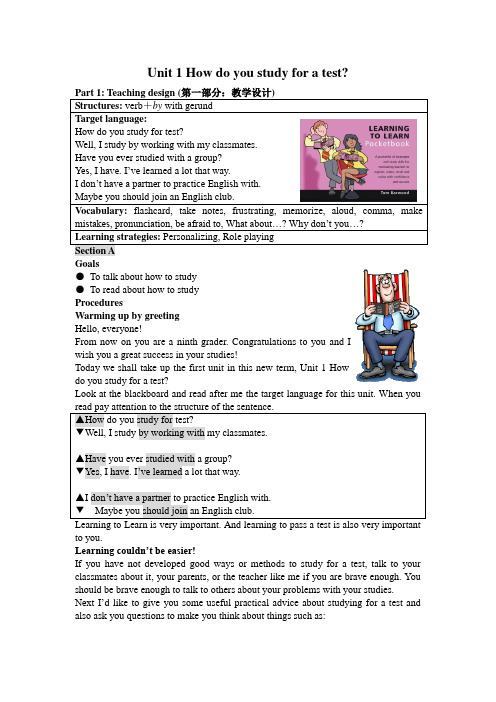
Unit 1 How do you study for a test?Part 1: Teaching design (第一部分:教学设计)Structures: verb+by with gerundTarget language:How do you study for test?Well, I study by working with my classmates.Have you ever studied with a group?Yes, I have. I’ve learned a lot that way.I don’t have a partner to practice English with.Maybe you should join an English club.Vocabulary: flashcard, take notes, frustrating, memorize, aloud, comma, make mistakes, pronunciation, be afraid to, What about…? Why don’t you…?Learning strategies: Personalizing, Role playingSection AGoals●To talk about how to study●To read about how to studyProceduresWarming up by greetingHello, everyone!From now on you are a ninth grader. Congratulations to you and Iwish you a great success in your studies!Today we shall take up the first unit in this new term, Unit 1 Howdo you study for a test?Look at the blackboard and read after me the target language for this unit. When you read pay attention to the structure of the sentence.▲How do you study for test?▼Well, I study by working with my classmates.▲Have you ever studied with a group?▼Yes, I have. I’ve learned a lot that way.▲I don’t have a partner to practice English with.▼Maybe you should join an English club.Learning to Learn is very important. And learning to pass a test is also very important to you.Learning couldn’t be easier!If you have not developed good ways or methods to study for a test, talk to your classmates about it, your parents, or the teacher like me if you are brave enough. You should be brave enough to talk to others about your problems with your studies.Next I’d like to give you some useful practical advice about studying for a test and also ask you questions to make you think about things such as:▲motivation▲how to learn your lessons in the ninth grade year▲different modes of teaching you may meet▲how to develop particular skills, such as note-taking in class1A: Checking the ways you studyI study for a test___By reading to the tape; By underlining the expressions; By reading beyondthe text; By doing used exam papers; By going over exercises books; Bycopying down the text; By learning the text by heart; By speaking with classmatesthe added ways on the blackboard.1b Listening and writingListen to understand how these people in the picture on page 2 study for a test. Write letters from the pictures. While listening, pay attention to the structures of the sentences.Section A 1b TapescriptBoy1:Hey, gang. There’s a big test on Tuesday. I really need some help. Can you tell me how you study for a big test?Voices: Sure! Yes. Sure we will.Boy1:You did really well on the last English test, didn’t you,Mei?Girl1: Yeah, I did OK.Boy1: Well, how did you study?Girl1:By making flashcards.Boy1:Maybe I’ll try that. How did you study, Pierre?Boy2: By asking the teacher for help. She was really happy I asked.Boy1:That’s interesting. How do you study, Antonio?Boy3: I like to study by listening to cassettes. But sometimes my mot her thinks I’m listening to music. And then she gets mad.Boy1:Oh, well…A: How do you study for a test?B: I study by working with a group.C: I study by listening to English.D. I study by playing games with my classmates.E. I study by doing actions such as coloring, matching.F. I study by singing English songs.G. I study by writing letters and emails.H. I study by acting out simple dialogues.I. I study by listening to and understanding stories.J. I study by writing simple sentences.K. I study by imitating from the recording.L. I study by speaking out words or phrases.M. I study by doing simple role plays.N. I study by reading and understanding simple stories.O. I study by using daily expressions.P. I study by performing short plays.Q. I study by performing simple rhymes.R. I study by writing sentences for pictures.S. I study by writing out simple poems.T. I study by reading aloud correctly.U. I study by playing text plays.V. I study by working with classmates.W. I study by going over the text before class.X. I study by copying words and expressions.Y. I study by looking and saying.Z. I study by asking others questions.2a Listening and checkingNow let’s go to page 3. Listen to the tape and check the questions you ask.While listening, pay attention to the structures of the sentences.Section A 2a, 2b TapescriptGirl1:Welcome to the English club. Today we’re going to talk about the best ways to learn English. Who has an idea?Boy1: Do you learn English by watching English-language videos?Girl2:No. It’s too hard to understand the voices.Boy1: What about keeping a diary in English? Do you learn English that way?Girl2:I think so. It helps to write English every day.Girl3: Have you ever studied with a group?Girl2:Yes, I have! I’ve learned a lot that way.Girl1: Do you ever practice conversations with a friend?Girl2:Oh, yes. It improves my speaking skills.Boy1: What about reading aloud to practice pronunciation?Girl3: I do that sometimes. I think it helps.Boy2: I do too. And I always look up new words in a dictionary.Girl3:That’s a great idea!2b Listening and matchingListen again and match each question from 2a with an answer in the box on page 3.2c Doing a pairworkNext we are going to make a conversation in pairs using the information from activities 2a and 2b.A: Have you ever studied with a group?B: Yes, I have. I’ve learned a lot that way.A: Have you ever learned English by watching videos?B:Yes, I have. I’ve learned a lot that way.A: Have you ever practiced conversations with friends?B:Yes, I have. I’ve learned a lot that way.A: Have you ever listened to tapes?B:Yes, I have. I’ve learned a lot that way.A: Have you ever read aloud to practice pronunciation?B:Yes, I have. I’ve learned a lot that way.1.Reading to the tapeWe are going to read the article on page 4. First we shall readto the tape together. That is, we start reading aloud as therecorder goes, and we stop reading aloud as the recorderstops. While reading, let’s pay enough attention to the pauses,the pronunciation and the intonation of the native reader.M ake our reading aloud as the same as the reader’s.2.Reading and dividing the article into partsNext we are going to read aloud the article slowly and clearly. We will try to divide it into thought groups.3.Reading and underliningThis week/ we asked students/ at New Star High School/ about the best ways/ to learn more English. Many said/ they learnt/ by using English. Some students had more specific suggestions. Lillian Li, for example, said/ the best way/ to learn new words/ was by reading English magazines. She said that/ memorizing the words of pop songs/ also helped/ a little. When we asked about studying grammar/ she said, “I never study grammar. It's too boring.”Wei Ming feels differently. He's been learning English/ for six years/ and really loves it. He thinks/ studying grammar /is a great way/ to learn a language. He also thinks that/ watching English movies/ isn't a bad way/ because he can watch the actors/ say the words. Sometimes, however, he finds watching movies/ frustrating/ because the people speak too quickly.Lin Chang said that/ joining the English club/ at school/ was thebest way/ to improve her English. Students get lots of practice/ andthey also have fun. She added that/ having conversations/ withfriends/ was not helpful/ at all. "We get excited/ about something/and then/ end up speaking/ in Chinese,” she said.Ways of learning EnglishNot successful OK SuccessfulLillian Li Studyinggrammar memorizing thewords of pop songsreading EnglishmagazinesWei Ming watching movies watching English studying grammarmoviesLiu Chang havingconversations/ withfriends joining the English clubSilence, please! We are going to have a role play in pairs. One of the pair is to be one Zhao: Excuse me, Li Hong. Could you help me with my English?Li: Yes, please. What’s the matter?Zhao: I have difficulty studying grammar.Li: Grammar? I never studying grammar. I study English mostly by memorizing the words of pop songs.Zhao: No grammar at all?Li:Yes, I did study grammar. But I study it by reading English magazines. I put grammar learning into reading articles. That is the best way to understand English grammar.Turn to page 4 to check √what you do to learn English in the box.Closing down by asking and answering—How did you learn English?*I listened to English them every day.**I learned many English songs by heart.*I sang the English songs to myself.*I learned every new English word in the text.*I learn English by going to English classes.*I do English homework at school.*I read English textbooks in the evening.*I speak English very slowly.**I read a lot of English sentences in the morning.*I do well in class English tests.*I get a lot of good advice on learning English from my teacher.*I discuss English problems with my classmates.*I follow the advice from my father.*I learn English sounds from the tape.*I use English-English dictionaries.*I listen to recordings and English-language TV.*I talk to native speakers every chance I got.*I read books in English, mostly novels.*I learn a lot of new words from English books.*I write more and more e-mail in English.*I use English more than my first language.*Most of my reading (websites and books) is in English.Section BGoals●To listen about learning English●To talk about learning English●To read about learning EnglishProceduresWarming up by reading to the recordingHello, everyone. To begin with, let’s listen and read to the recording of the text HOW DO YOU LEARN BEST? That is, read aloud to the tape, as fast as the tape goes, as clearly as the native reader reads. OK? Here we go!My cat speaks English.Sometimes my cat comes to me and tells me that she is hungry. Or that her leg hurts. How does my cat tell me these things? I don't speak pussy-cat language.1a Reading and checkingLearning English can be both easy and difficult. Whatthings are easy for you? And what things are difficult foryou? Now turn to page 5, read the list on the top and check√the statements that are true for you.1b Making a listYou have read and checked the statements true for you.Now think and make a list of other things difficult for you,too.I don’t know how to…!1. I don’t know how to use commas.2. I don’t know how to work with others.3. I don’t know how to make flashcards.4. I don’t know how to read the textbook.5. I don’t know how to make vocabulary lists.6. I don’t know how to listen to tape.7. I don’t know how to ask the teacher for help.8. I don’t know how to study for a test.9. I don’t know how to work with a group.10. I don’t know how to watch English videos.11. I don’t know how to practice conversations with friends.12. I don’t know how to read aloud to practice pronunciation.13. I don’t know how to learn by using English.14. I don’t know how to get more specific sug gestions.15. I don’t know how to read English magazines.16. I don’t know how to learn new words.17. I don’t know how to memorize the words.18. I don’t know how to studying grammar19. I don’t know how to watching English movies20. I don’t know how to joining the English club21. I don’t know how to improve her English22. I don’t know how to get lots of practice13. I don’t know how to ask teachers about the best ways to learn more English.2a Listening and checkingPaul is a nice boy. He works hard at his English, but still has many learning challenges. Now listen to find out what challenges he has and check them in the box on page 5.Challenges to Paul at learning English1._____ can’t get the pronunciation right.2._____ forget a lot of new words.3._____ can’t understand when people talk to me.4._____ can’t understand the words in magazines.5._____ don’t get much writing practices.2b Listening and matchingNow listen again to Paul talking about his challenges at learning English and match them with the solutions listed in the box on page 5. While listening, pay attention to the structures of the sentences.TapescriptTeacher:You look worried, Paul.Boy:I am, Ms Mitchell. I’m having trouble learning English.Teacher:You said you liked English. What’s the problem?Boy:I can’t get the pronunciation right.Teacher:Well, listening can help. Why don’t you borrow theteacher’s tapes? You can listen to them at home and repeatthe sentences that are difficult for you.Boy:That’s a good idea. But what about all the new words? I forget a lot of new words.Teacher:You can always write the new words in your notebook and study them at home. You can even study in the train on the way to school.Boy: That might really help! Thanks.Teacher:Can you understand when people talk to you?Boy:Well, no. Not always. Sometimes I just don’t understand what people are saying. Teacher:Why don’t you join an English language club to practice speaking English?The English club meets after school on Tuesdays and Thursdays.Boy:Maybe I’ll go. The only other problem I have is that I don’t get much writing practice.Teacher:Maybe you should find a pen pal.Boy: That sounds like a fun way to practice writing. Thanks, Ms Mitchell.2c Doing pairworkIN pairs we are going to role play conversations using the information from activities 2a and 2b.I don’t have a partner to practice English with. Maybe you should join an English language club.I can’t get the pronunciation right.Listening can help.I forget a lot of new words. Write the new words on cards and studythem daily.I can’t understand when people talk to me. You can join an English club to talk to people more in English.I can’t understand the words inmagazines.You can look them up in a dictionary.I don’t get much writing practices.Start writing an English diary every day.I read very slowly. You should read to the recording of thetext.I make mistakes in grammar. Why don’t study the basic sentencepatterns3a Reading and cuttingWe are going to read the text again to study the form and function ofall the predicate verbs.How I learned to learn EnglishLast year/ my English class/ was difficult/ for me. First of all, it wasn't easy/ for me/ to understand the teacher/ when she talked to the class. To begin with, she spoke/ too quickly, and I couldn't understand every word. Later on, I realized that/ it doesn't matter/ if you don’t understand/every word. Also/ I was afraid to speak/ in class, because/ I thought/ my classmates/ might laugh at me. I couldn't always make complete sentences, either. Then/ I started to watch English-language TV. It helped/ a lot. I think that/ doing lots of listening practice/ is of the secrets of becoming a good language learner. Another thing/ that I found/ very difficult/ was English grammar. So/ I decided to take lots of grammar notes/ in every class. Then/ I started to write my own original sentences/ using the grammar/(that) I was learning. It’s amazing/ how much/ this helped. Now/ I am enjoying learning English/ and I got an A/ this term. My teacher is very impressed.Now you may read the statements in the box on page 6 following the text. Write “T” or “F” beside each statement.3b Writing a letterDear Lin Feng,I know it isn’t easy to learn English, but I have some ideas that may help. You said you couldn’t understand people who talked fast. Well, you cantry to listen for the most important words, not every word. It isdifficult to understand by listening what you have not read orwhat you can’t understand well by reading. To listen well youhave to read well. So keep on reading English. Listening andreading to the recording of the text is very important, too. Everytext, after being read, should be listened to and read aloud to the tape. At first you may find it difficult to follow the reader reading aloud the text. Don’t worry. If you keep practicing you will be able to read aloud as fast as the native reader from the tape. And then you can understand people who talk fast in English.Yours,Tai Zuo4 Doing an interviewNext we shall do an interview in groups of four. Ask the three group mates about learning English. Take notes of what they say. Tomorrow you shall stand to tell the Q. What isn’t easy about learningEnglish?A. Reading is not easy.Q. What do you do about this? A. I try to cut the sentences into thoughtgroups.Q. What is your favorite way to learn more English? I read and read aloud a lot. These are the best way.Rain, rain, go away,Come again another day,Little JohnnyWants to play.Rain, rain, go to Spain,Never show your face again.SELF CHECK1.Filling in the blankWe shall make a check on our use of expressions first. Turn to page 7 and fill in each blank with the correct word given. Change the form of the word if necessary. ThenComplete the sentences Make your sentences1. You should write down new Englishwords in a vocabulary list.Don’t trust your memory. Write it down.2. If you don’t know how to spell newwords, look them up in a dictionary.I don’t know how to spell your name.3. The best way to improve your Englishis to join an English club.I’d like to join the school football tea.4. Another thing that he find very difficultwas English grammar.I find it easy to learn English.5. This kind of paper feels very soft. Do you feel cold?Turn to page 7 and write an article about Xu Zheng using the notes on Xu and his essay.As English is learned mostly through reading in China, we shall now turn to page 8 to learn to read the article entitled: How do we deal with our problem?Before reading,please go over the vocabulary list for reading on page 146. Get yourself familiarized with all the words and expressions to be found in the article.Tips for BeginnersYou are like a new babyBabies learn their language slowly.First they learn to listen.Then they learn to talk.Finally, they can read and write.Listen to English every dayListen to English radio.Watch English TV.Go to English movies.Use online lessons.Make an English/ESL friendMake up conversations.Practice dialogues.Use beginner textbooks.Read English storiesStart with children's storybooks.Try ESL readers.Read advertisements, signs and labels.Write down new wordsStart a vocabulary (new word) notebook. Write words in alphabetical order (A...B...C...). Make example sentences.Always use an English-English dictionary first. Keep an English diaryStart with one sentence.How do you feel?How is the weather?What did you do today?Write another sentence tomorrow. Visit an English speaking country Learn English more quickly. Stay with an English family. Hear native speakers talk.Have a fun experience.。
九年级英语-Unit1_How_do_you_study_for_a_testAlHHHn
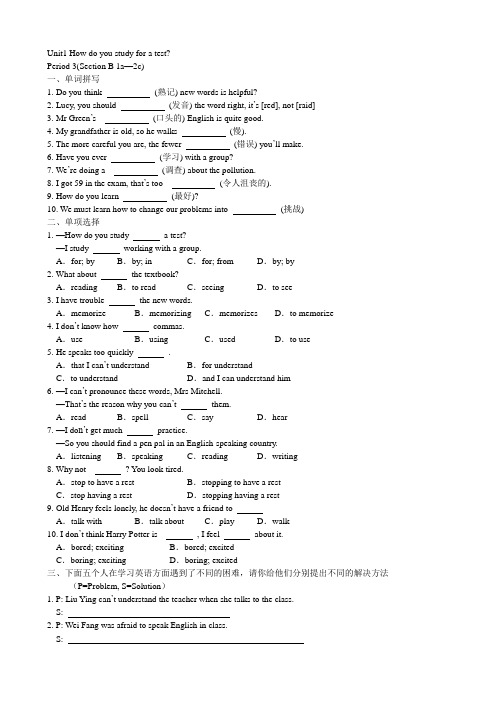
Unit1 How do you study for a test?Period 3(Section B 1a—2c)一、单词拼写1. Do you think (熟记) new words is helpful?2. Lucy, you should (发音) the word right, it’s [red], not [raid]3. Mr Green’s (口头的) English is quite good.4. My grandfather is old, so he walks (慢).5. The more careful you are, the fewer (错误) you’ll make.6. Have you ever (学习) with a group?7. We’re doing a (调查) about the pollution.8. I got 59 in the exam, that’s too (令人沮丧的).9. How do you learn (最好)?10. We must learn how to change our problems into (挑战)二、单项选择1. —How do you study a test?—I study working with a group.A.for; by B.by; in C.for; from D.by; by2. What about the textbook?A.reading B.to read C.seeing D.to see3. I have trouble the new words.A.memorize B.memorizing C.memorizes D.to memorize4. I don’t know how commas.A.use B.using C.used D.to use5. He speaks too quickly .A.that I can’t understand B.for understandC.to understand D.and I can understand him6. —I can’t pronounce these words, Mrs Mitchell.—That’s the reason why you can’t them.A.read B.spell C.say D.hear7. —I do n’t get much practice.—So you should find a pen pal in an English-speaking country.A.listening B.speaking C.reading D.writing8. Why not ? You look tired.A.stop to have a rest B.stopping to have a restC.stop having a rest D.stopping having a rest9. Old Henry feels lonely, he doesn’t have a friend toA.talk with B.talk about C.play D.walk10. I don’t think Harry Potter is , I feel about it.A.bored; exciting B.bored; excitedC.boring; exciting D.boring; excited三、下面五个人在学习英语方面遇到了不同的困难,请你给他们分别提出不同的解决方法(P=Problem, S=Solution)1. P: Liu Ying can’t understand the teacher when she talks to the class.S:2. P: Wei Fang was afraid to speak English in class.S:3. P: Li Lei doesn’t have a partner to practice English with. S:4. P: Wu Dong doesn’t get much writing practice.S:5. P: My brother can’t remember a lot of new words.S:。
人教版九年级英语Unit 1 How do you study for a test- Section A教案及教学反思
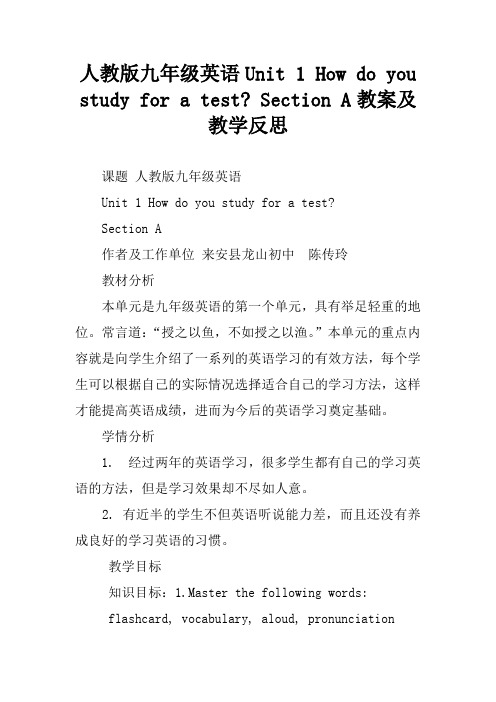
人教版九年级英语Unit 1 How do you study for a test? Section A教案及教学反思课题人教版九年级英语Unit 1 How do you study for a test?Section A作者及工作单位来安县龙山初中陈传玲教材分析本单元是九年级英语的第一个单元,具有举足轻重的地位。
常言道:“授之以鱼,不如授之以渔。
”本单元的重点内容就是向学生介绍了一系列的英语学习的有效方法,每个学生可以根据自己的实际情况选择适合自己的学习方法,这样才能提高英语成绩,进而为今后的英语学习奠定基础。
学情分析1. 经过两年的英语学习,很多学生都有自己的学习英语的方法,但是学习效果却不尽如人意。
2. 有近半的学生不但英语听说能力差,而且还没有养成良好的学习英语的习惯。
教学目标知识目标:1.Master the following words:flashcard, vocabulary, aloud, pronunciation2.Be able to master the ways of learning English技能目标:1.Be able to talk about the ways of learning English with your partners.2.Be able to understand what they listen in class.情感目标:Have a positive attitude towards learning English.教学重点和难点重点:Master the ways of learning English well.难点:1.Be able to talk about the ways of learning English with your partners.2. Have a positive attitude towards learning English.教学过程。
九年级英语Unit 1 How do you study for a test知识精讲
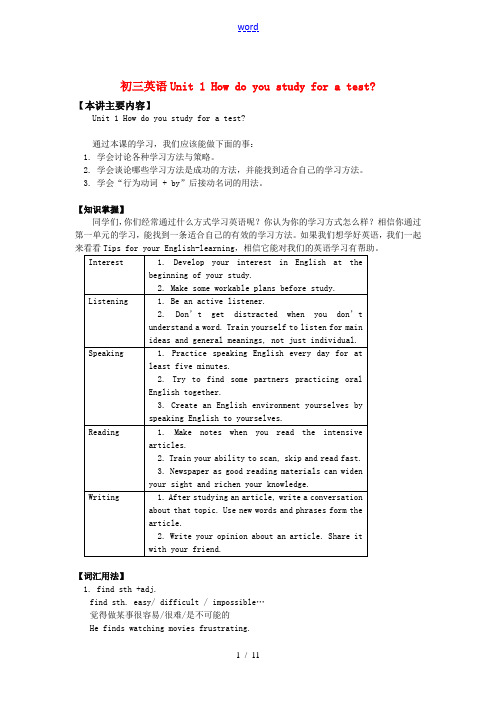
初三英语Unit 1 How do you study for a test?【本讲主要内容】Unit 1 How do you study for a test?通过本课的学习,我们应该能做下面的事:1. 学会讨论各种学习方法与策略。
2. 学会谈论哪些学习方法是成功的方法,并能找到适合自己的学习方法。
3. 学会“行为动词 + by”后接动名词的用法。
【知识掌握】同学们,你们经常通过什么方式学习英语呢?你认为你的学习方式怎么样?相信你通过第一单元的学习,能找到一条适合自己的有效的学习方法。
如果我们想学好英语,我们一起【词汇用法】1. find sth +adj.find sth. easy/ difficult / impossible…觉得做某事很容易/很难/是不可能的He finds watching movies frustrating.他认为看电影是令人不愉快的。
He said that, after Russian, I should find German easy.在学过俄语之后,我应该觉得德语容易学。
find it +adj. to do sth.He found it almost impossible to express what he wanted to say.他觉得要表达他想说的话几乎是不可能的。
think it + adj + to do sthWe thought it unnecessary to argue with him about it.2. end up +doing sth. 结果为……;以……结束(尤其指意料之外的事情)We were going to go out, but ended up watching videos.我们原计划外出,但结果却是在家看录像。
3. It is +adj. +for sb. to do 对于某人来说,做某事是……的It is impossible for us to finish the work without your help.对于我们来说,没有你的帮助来完成工作是不可能的。
Unit-1--How-do-you-study-for-a-test单元知识点总结归纳
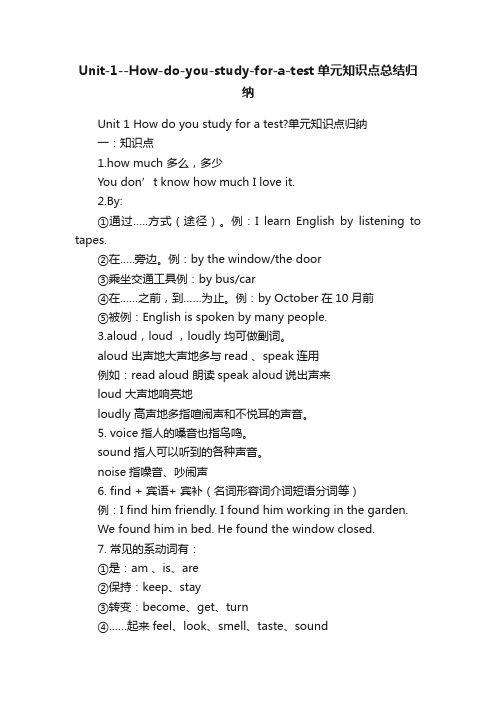
Unit-1--How-do-you-study-for-a-test单元知识点总结归纳Unit 1 How do you study for a test?单元知识点归纳一:知识点1.how much 多么,多少You don’t know how much I love it.2.By:①通过…..方式(途径)。
例:I learn English by listening to tapes.②在…..旁边。
例:by the window/the door③乘坐交通工具例:by bus/car④在……之前,到……为止。
例:by October在10月前⑤被例:English is spoken by many people.3.aloud,loud ,loudly 均可做副词。
aloud 出声地大声地多与read 、speak连用例如:read aloud 朗读speak aloud说出声来loud 大声地响亮地loudly 高声地多指喧闹声和不悦耳的声音。
5. voice指人的嗓音也指鸟鸣。
sound指人可以听到的各种声音。
noise指噪音、吵闹声6. find + 宾语+ 宾补(名词形容词介词短语分词等)例:I find him friendly. I found him working in the garden.We found him in bed. He found the window closed.7. 常见的系动词有:①是:am 、is、are②保持:keep、stay③转变:become、get、turn④……起来feel、look、smell、taste、sound8. get + 宾语+ 宾补(形容词过去分词动词不定式)使某种情况发生例:Get the shoes clean. 把鞋擦干净Get Mr. Green to come. 让格林先生进来I want to get my bike repaired. 我想去修自行车You can’t get him waiting. 你不能让他老等着9. 动词不定式做定语①与所修饰的名词构成主谓关系The next train to arrive was from New York.He is always the first to come.②与所修饰的名词构成动宾关系I have nothing to say.I need a pen to write with.I need some paper to write on.I don’t have a room to live in.10. practice , fun做名词为不可数名词11. add补充说又说12. join加入某团体并成为其中一员attend出席参加会议或讲座join in与take part in指参加到某项活动中去。
九年级英语全册 Unit 1 How do you study for a test教案1 人教新目标版

Unit 1 How do you study for a test?单元分析内容提示本单元主要内容是学会利用verb十by/with gerund表示方式方法来讨论学习英语的策略,认识自己在学习方面的长处和不足。
初步了解现在完成时的结构和用法。
现在完成时由助动词have/has+动词的过去分词构成,主要表示过去发生的某一动作对现在仍有影响或造成的后果,常与already,yet,just,ever,never等副词连用。
教学目标一、学习目标(Language Goal)1. Talk about how to study . 学会讨论各种学习方法和策略。
2. Find out your suitable learning methods. 找出适合自己的学习方法。
二、语言结构(Language Structures)1. Verb + by with gerund by+动名词短语表示“通过…途径,方法”2. How questions have引导的特殊疑问句三、目标语言(Target Language)1. How do you study for tests ? 你是怎样准备考试的?Well , I study by working with my classmates. 哦,我和同学们一起学习。
2. Have you ever studied with a group ? 你曾经参加过学习小组吗?Yes , I have . I’ve learned a lot that way . 是的,参加过。
通过这种方式我学了许多。
3. I don’t have a partner to practice English with . 我没有同伴可以练习英语。
Maybe you should join an English club. 或许,你应该参加一个英语俱乐部。
4. What about reading aloud to practice pronunciation ? 大声朗读来练习发音怎么样?Why don’t you join an English language club ? 你为什么不参加一个英语俱乐部呢?四、重点词汇(Key words and phrases)1. flashcard n. 抽认卡2. frustrating a. 令人沮丧的3. memorize v. 记忆,背诵4. aloud adv. 出声地、高声地5. comma n. 逗号6. pronunciation n. 发音7. solution n. 解决办法8. not at all 根本(不)全然(不)9. end up 结束,告…终10. make mistakes 犯错11. later on 以后;随后12. be afraid to 害怕去做13. laugh at sb. 笑话;取笑(某人)14. take notes 做笔记,做记录15. enjoy doing sth . 喜欢做…乐意做…16. native speaker 说本族语的人17. make up 组成、构成五、重点、难点(Key points and difficulties)1. by 介词,表示“通过…方法或途径”的意思,译成“靠、通过” by后面可以加名词或动名词短语。
九年级英语 Unit 1 How do you study for a test教案 人教新目标版

The Teaching Plan for “Unit 1 How do you study for a test?”I. Analysis of the teaching materialThe content of this lesson is adopted from Go for it Book III Unit1. The topic of this unit is about learning how to study things. By reviewing this unit, students will be able to master the key vocabulary words and sentence patterns of this unit, and they’ll be better to talk about various learning ways, problems in learning, asking for and giving advice, and comments on ways of learning. Obviously, the topic of this unit is related closely to students' actual life, so it will raise students learning interest. They have a great desire to talk about the problems they met in learning English and they wish to solve these problems. So we can provide situations for students to exchange ideas in the process of study and help them find the most suitable ways to improve their English. It will also cultivate students’ ability of using English to solve the practical problems. Besides, students will learn to regard problems as challenges and try their best to find ways to solve them.According to English syllabus, new curriculum standards and the type of the lesson---- revision, I will use “English learning” as a clue to review the key vocabulary and sentence patterns. Wilki ngs, a great linguist once said, “Without grammar, very little can be conveyed. Without vocabulary, nothing can be conveyed.” So, in this lesson, I lay great emphasis on the review of vocabulary. As words are used in sentences, I will review the key words and phrases in the sentences or contexts. Generally speaking, I’ll review the unit from the following four parts: ways of learning, problems, advice and comments. The four parts connect to each other closely and the topics are from easy to difficult. On the other hand, the four parts involve the main sentence patterns and key vocabulary students must master in this unit. By reviewing the unit like this, at the end of the lesson, students are expected to write a letter about how to learn Chinese well based on what we reviewed.II. Analysis of learning conditionThe students I’m going to teach are from Wencheng Experimental Middle School. Most of them have a strong English background. So in this period, I mainly focus on how to get students to behave actively. And as a famous Italian doctor says, “Tell me and I will forget. Show me and I understand. Involve me and I remember!” In order to help the students master the key language points of this unit, I design different tasks for them to do, which will greatly get them involved in the classroom activities. As a result, they will have a better understanding of the language points.III. Teaching Objectives1. Knowledge Objectives(1) The students will be able to master the key vocabulary words of this unit byreviewing them in different ways: make flashcards, pronunciation, differently, fast, deal with, regard, make mistakes, afraid, too … to …, etc.(2) The students will be able to use the following four sentence patterns in thegiven situations or daily life:①How do you learn English? I learn English by...② Why don’t you / Why not ...?③ Maybe you should …. / You’d better …④ I think studying English by …is…because…2. Ability Objectives(1)The students will be able to talk about their learning ways, and commenton the ways of learning English as well as the problems they meet in learning English and the solutions to them.(2) The students will be able to get information from reading passage.(3) The students will be able to use the words and sentence patterns reviewedin this period to write a passage about how to learn Chinese well.3. Emotion & attitude Objectives(1) The students will form a correct attitude to study.(2) The students will learn to choose good ways to study.4. Learning Strategies(1) The students will be able to get the information needed from the givenreading material. (Resourceful strategy)(2) The students will be able to make up a dialogue according to the providedsituation. (Communicative strategy)(3) The students will be encouraged to comment on the different ways of learning.(Cognitive strategy)IV. Teaching Focus1.The ways of learning English.2.The comment on the ways of learning English.3.The difficulties in learning English.4.The suitable learning ways for individuals.V. Teaching difficulties1.How to get students to review the key vocabulary and expressions presented inthis unit.Solutions: Review the vocabulary in different ways: brainstorming, practicing, explaining, writing a letter, etc.2.How to enable students to write a passage well enough.Solution: Review the vocabulary and sentence patterns may be used in the passage.3.How to make students master the usage of “verb +by with gerund”.Solution: Design tasks for students to do. By fulfilling the tasks, students are expecte d to use “verb +by with gerund” and thus know the usages of it well. VI. Teaching Methods1、Communicative approach2、Task-oriented method3、Practicing approach4、Situation-experienced methodVII. Teaching AidsMulti-media equipmentsVIII. Teaching ProceduresStep 1.Leading-in & Brain-stormingT: Class begins! Good morning, everyone!Ss: Good morning, teacher!T: Glad to meet you! Today is the first time we meet each other. Now let me introduce myself to you. I come from No. 2 Experimental Middle School. My name is Hu Haiyan. You can call me Miss Hu. I think we’ll have a good time together. Ok, now I’d like to know something about you. What’s your name? What’s your favorite subject? Why?S1: ….T: Do you like English? How do you study English?S2: …T: What about you? What do you think of your way?S3: …T: Hi! Nice to meet you! How long have you been learning English?S4: ….T: Well, most of you have been learning English for many years. And all of you have your own ways to learn English. Now take out the worksheet I gave you just now and fill in the mind map about the ways of English learning. Let’s see who can write the most ways.(Ss try to write as many ways of English learning as possible.)T: OK. Are you ready? How many ways have you written? Show me your answers please. Who’d like to share your answers?(Ask two or three students to say the ways of English learning.)Design purpose: Talk with students freely can get a general idea about how well students mastered this unit and on the other hand, can help construct a relaxing learning atmosphere. The brainstorming activity can activate students’ knowledge about the ways of learning English. As a result, help them review the phrases of learning ways.Step 2. Survey & ReportT: So there’re many ways of English learning. And how do you learn it? What about your friends. What do you think of the ways? Please work in groups of four and make a survey about it. Fill in the chart in your worksheet.(Ss work in groups and try to fill in their charts.)T: Well, have your completed your survey chart?Ss: Yes.T: Good. Let’s make a report. Please pay attention to the sentence patterns you use. For example, when we find one way is not successful, we can say I think it’s not helpful at all. (Write “not …at all” on the blackboard.) Who’d like to give a report about it?(Let 3or 4 students give reports about their survey results.)Design purpose: This activity makes students work cooperatively and use phrases in sentences properly, which will not only review the sentence patterns, but also train students’ communicative ability. As to the students who are good at English, they can further their ability by giving reports about how their friends learn English. And the students will try to express their own attitudes toward variousways of learning in target language.Step 3. InterviewingT: You see, every one has his or her own ways of learning. And some students’ ways are really very successful. Recently there is an English Speech Contest in Wenzhou. Some students really did well in it. And the winders are asked to hold a news conference. Suppose you took part in the contest, too. Now please work in groups of four to role play it. One is the winner; the others are the reporters from different TV stations. Try to ask as many questions as you can.(After students practice for a while, invite one or two students to come to the front as a winner, and let the other students ask them questions about English learning.)Design purpose: There are two purposes for the design of the News Conference: One is to review the two sentence patterns “Do you …” and “Have you ever …” And the other is to train students’ speaking ability and activate the classroom atmosphere ---- Get every student involved in the activity.Step 4. PracticingT: Congratulations! Your spoken English is really wonderful. What about other students? It seems you’re not confident enough to come to the front. Are you good at English? Do you have any difficulties in learning English? If so, what are they?(Let some students talk about the problems they face.)T: Well, don’t worry. It’s quite common to meet problems while learning something. My students have trouble learning English, too. Here’re their problems. But some of the words are missing. Can you help me to complete the sentences? Please take out the worksheet again. And try to complete the sentences in it.(Check the answers after students finish the task and help the students to review the key words and phrases presented in the ten sentences.)Design purpose: By doing exercise, students will review the main sentence patterns about the problems students meet in learning English and the words related to this topic. And in the process of checking the answers, the teacher can remind the students of the usages of some important words and phrases.Step 5. PairworkT: Well done. You’ve got all the answers right. But here comes another problem. There are so many problems we may meet in learning English, but we still need to learn English well. How can we deal with them? How do you deal with the problems you meet in learning English? Show me your ideas.(Let different students talk about how they solve problems.)T: Good idea. I’ll tell these solutions to my students. Do you know how I usually solve my problems?Ss: No.T: Well, generally speaking, I have two ways to solve problems. First of all, I’ll deal with my problems by regarding them as challenges. And I’ll try my best to overcome the difficulties. And if I can’t solve them by myself, I’ll ask someone else for advice. Do you like to ask others for advice?Ss: Yes.T: Then let’s work in pairs and tell your partner your problems. I think we can solve the problems together. Do you think so?(Ss work in pairs and make conversations. After they practice for a while, invite some pairs of them to present their conversations.)Design purpose: In this activity, students are asked to ask for and give advice to each other. By doing this, students will review the sentence patterns about how to make suggestions.Step 6. ReadingT: Good job. I wish all of you will try to regard all your problems as challenges and try your best to overcome them. I really appreciate these kinds of people. My friend Tom is such a person. Let’s see what problems he met and how he solved them. Please read the passage about him in your worksheet and try to complete the chart below it.(Students read the passage individually and try to get information to fill in the chart.)T: Are you ready?Ss: Yes.(Check the answers.)T: Excellent! Your reading ab ility is pretty good. Now we’ve known how Tom studied English. What do you think his solutions? I think studying English by joining an English club is a good way because you can ask others when you have questions. What’s your opinion?(Let different students comment on the ways of learning English, using the sentence pattern “I think studying English by… is … because…”) Design purpose: In this part, students are supposed to get information from the reading passage quickly and to give comments on ways of learning by using the sentence pattern “I think studying English by … is … because ….” As to this step, students should learn to combine simple sentences to make a complex one. This will help them improve their writing ability.Step 7 WritingT: Ok. Today we talked much about English learning. Suppose you have a pen pal named Bob is coming to Wencheng soon. And he’d like to learn Chinese. As a Chinese, I believe you can give him much advice. Please write a letter to him and tell him how to learn Chinese well. You can use the key words provided in your worksheet. And here are some tips for you. Try to answer the following questions in your mind, and you’ll know what should be included in your writing.1.How long have you been learning Chinese?2.How did you learn Chinese?3.What challenges did you meet in learning Chinese?4.What’s your attitude toward the problems you met?5.How did you deal with the problems of Chinese learning6.What do you think your ways of learning Chinese?(Ss work individually to write the letter. If time is enough, I’d ask some of the students to read their letters and give comments on them.)Design purpose: The writing task is designed to see if students have already mastered all the points reviewed in this period. And it provides students a chance to output the language they learned. On the other hand, this activity helps students have a summary of what they have reviewed in this unit by answering the questions the teacher provided in sweet tips.Step 8. Emotional EducationT: How time flies. There is not enough time for us to present your writing now. Before we end the lesson, I’d like to have a word with you. Where there is a will, there is a way. Believe yourself and work persistently, you’ll get good grades in the Entrance Examination to Senior Middle School.Design purpose: This step is to guide students to form a good attitude toward the difficulties they meet in learning procedures or daily life.Step 9. HomeworkT: Ok. Today’s homework:1.Make a vocabulary list of the key words and expressions learned in this unit.2.Finish your writing and try to improve it.plete the two exercises in your Homework sheet.So much for today’s lesson. Wish you succeed every day. Goodbye, class. Ss: Goodbye, Miss Hu.IX. The blackboard design。
Unit-1-How-do-you-study-for-a-test教案正式版

U n i t-1-H o w-d o-y o u-s t u d y-f o r-a-t e s t教案正式版 -CAL-FENGHAI-(2020YEAR-YICAI)_JINGBIANUnit 1 How do you study for a test教案总课时:5课时备课时间:第一周上课时间:第一周第一课时The first period ( grammar and vocabulary )教学目标:Teaching aims:1.知识目标:重点词汇:flashcard, take notes, frustrating, memorize, aloud, comma, make mistakes, pronunciation, be afraid to, what about, why don’t you…重点句型:How do you study for tests /Well. I study by working with my classmates.Have you ever studied with a group /Yes, I have. I’ve learned a lot that way.I don’t have a partner to practice English with. /Maybe you should join an English club. 2.能力目标:⑴学会谈论学习方法⑵学会谈论学习中遇到的困难⑶学会针对学习中的困难,给别人提建议⑷学会评价学习方法教学重难点:重点:verb + by with gerund难点:运用所学知识谈论学习中的困难,并能提出相应建议。
.教学准备: tape recorder flashcards.教学方法:情景操练,反复使用,师生互动,生生互动。
.教学进程:Step One Free talk(5’)1.Greeting.2.Duty reportStep Two PresentationT: What do you do to improve your English?S1:I listen to the tape to improve my English.S2:I listen to the English songs to improve my English.S3:I watch English movies to improve my English.T:OK. We can also say:How do you improve your English?I improve my English by listening to the tape.I improve my English by listening to the English songs.I improve my English by watching English movies.2. Ss repeat these sentences. Then make the conversations in pairs.Step Three Grammarby + v-ing 形式,by意为通过或凭…方法,后面接动名词,该结构表示通过某事得到某种结果。
人教版九年级英语Unit 1 How do you study for a test Section A 英文说课稿
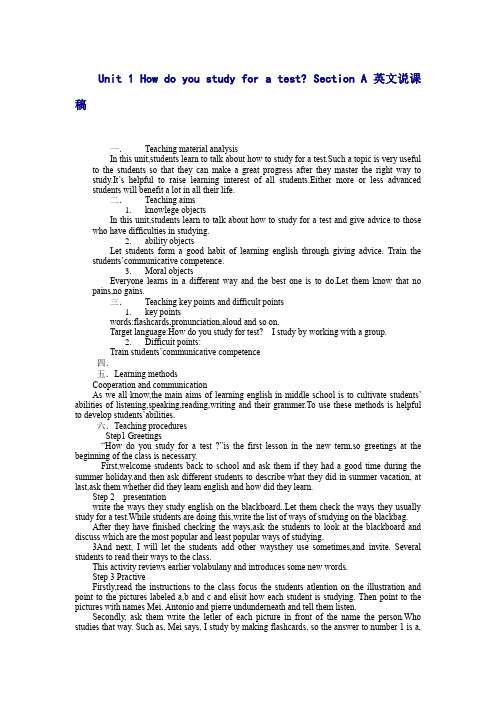
Unit 1 How do you study for a test? Section A 英文说课稿一.Teaching material analysisIn this unit,students learn to talk about how to study for a test.Such a topic is very useful to the students so that they can make a great progress after they master the right way to study.It’s helpful to raise learning interest of all students.Either more or less advanced students will benefit a lot in all their life.二.Teaching aims1.knowlege objectsIn this unit,students learn to talk about how to study for a test and give advice to those who have difficulties in studying.2.ability objectsLet students form a good habit of learning english through giving advice. Train the students’communicative competence.3.Moral objectsEveryone learns in a different way and the best one is to do.Let them know that no pains,no gains.三.Teaching key points and difficult points1.key pointswords:flashcards,pronunciation,aloud and so on.Target language:How do you study for test?---I study by working with a group.2.Difficuit points:Train students’communicative competence四.五.Learning methodsCooperation and communicationAs we all know,the main aims of learning english in middle school is to cultivate students’ abilities of listening,speaking,reading,writing and their grammer.To use these methods is helpful to develop students’abilities.六.Teaching proceduresStep1 Greetings“How do you study for a test ?”is the first lesson in the new term,so greetings at the beginning of the class is necessary.First,welcome students back to school and ask them if they had a good time during the summer holiday.and then ask different students to describe what they did in summer vacation, at last,ask them whether did they learn english and how did they learn.Step 2 presentationwrite the ways they study english on the blackboard..Let them check the ways they usually study for a test.While students are doing this,write the list of ways of studying on the blackbag.After they have finished checking the ways,ask the students to look at the blackboard and discuss which are the most popular and least popular ways of studying.3And next, I will let the students add other waysthey use sometimes,and invite. Several students to read their ways to the class.This activity reviews earlier volabulany and introduces some new words.Step 3 PractiveFirstly,read the instructions to the class focus the students atlention on the illustration and point to the pictures labeled a,b and c and elisit how each student is studying. Then point to the pictures with names Mei. Antonio and pierre undunderneath and tell them listen.Secondly, ask them write the letler of each picture in front of the name the person.Who studies that way. Such as, Mei says, I study by making flashcards, so the answer to number 1 is a,play the tape for the first time, students only listen. Play the tape a second time, students write dowm their answers. After listening, I will invite several students to check the answer, then I will give the right answers.Step 4 ProductionFirst, read the instructions to the class. And call the students attention to the conversation in the box. Invite a pair of students to read it to the class. And then tell the students look at the other ways of studying in activity 1 and ask their partner how he/she studies for a test. As students work,I will listen in on various pairs checking proress and offer help as needed. And after students havea ahance to practice act out their conversation.This activity givers students oral practice using the target languge therefore, it can improve their speaking skill.七,SummaryIn this class, we’ve learned some new words, such as flashcard, vocabulary. And we’ve also learned the target langguagge: how do you study for a test? Istudy by working with group.八,HomeworkAsk students to interview students in other class, family members, and friends to try to discover some new ways of studying that haven’t been introduced in the book or in class.九, Blackboard DesignHow do you study for a testSection A1, Ways of studyingBy working with friends by making flashcardsBy reading the textbook by making vocabalary listsBy listening to tapes by asking the teacher for help2, Target languageA How do you study for test?B I study by working with a group.。
Unit 1 How do you study for a test-review

重点语法
一,How 引导的特殊疑问句及答语。
How 在本单元中询问方式、方法,意为“怎样, 怎么,如何”。回答这种问句时常用by短语或 by后接动词的ing形式,表示“用…手段、方式” 或“凭借…交通工具”
How do you learn English?你怎样学英语?
I learn English by reading aloud. 我通过大声朗读学 英语。
根据首字母填词
loud , so everyone in the 1.Please read a____ classroom can hear you. 2.We can’t understand him because his ronunciation is bad. p____ 3.I can’t understand him because he speaks uickly too q___. 4.The two words sound the same but they ifferently are spelled d___. 5.This article is new to me, so I have to read it s___. lowly
be afraid to, look up, laugh at, make up, take notes
1.It’s not right tolaugh ____ at poor people. 2.Don’tmake ____up stories any more. We don’t believe you. 3.Don’tbe ____ afraid tomake mistakes when you learn a foreign language. 4.When you meet a new word, you canlook __ it up ___ in the dictionary. 5.Our English teacher thinkstaking ___ notes is important when we learn English grammar.
unit-1how-do-you-study-for-a-testperiod-2-九年级

Liu Chang said that joining the English club at
school was the best way to improve her English.
Students get lots of practice and they also have fun.
This week we asked students at New Star High School about the best ways to learn more English. Many said they learnt by using English. Some students had more specific suggestions. Lillian Li, for example, said the best way to learn new words was by reading English magazines. She said that memorizing the words of pop songs also helped a little. When we asked about studying grammar, she said, “I never study grammar. It’s too boring.”
Wei Ming
1. Studying grammar is a great way to learn a language.
2. Watching English movies is not a bad way.
3. I find watching movies frustrating because the
九年级英语-Unit_1_How_do_you_study_for_a_test?AlHHHA
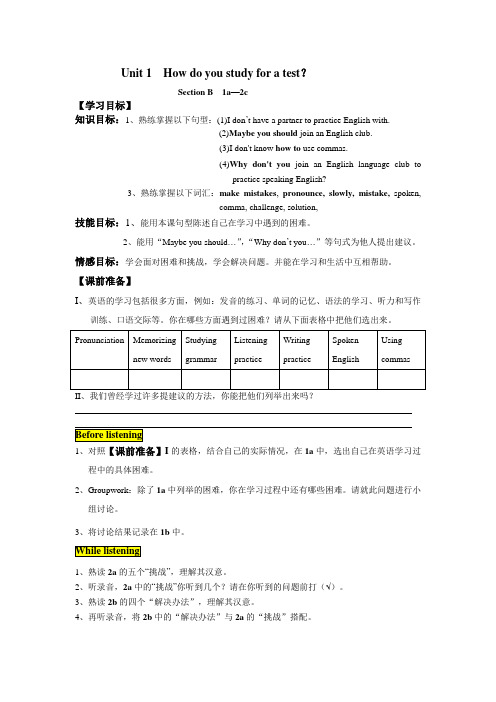
Unit 1 How do you study for a test?Section B 1a—2c【学习目标】知识目标:1、熟练掌握以下句型:(1)I don’t have a partner to practice English with.(2)Maybe you should join an English club.(3)I don't know how to use commas.(4)Why don't you join an English language club topractice speaking English?3、熟练掌握以下词汇:make mistakes,pronounce, slowly, mistake, spoken,comma, challenge, solution,技能目标:1、能用本课句型陈述自己在学习中遇到的困难。
2、能用“Maybe you should…”,“Why don’t you…”等句式为他人提出建议。
情感目标:学会面对困难和挑战,学会解决问题。
并能在学习和生活中互相帮助。
【课前准备】I、英语的学习包括很多方面,例如:发音的练习、单词的记忆、语法的学习、听力和写作训练、口语交际等。
你在哪些方面遇到过困难?请从下面表格中把他们选出来。
II、我们曾经学过许多提建议的方法,你能把他们列举出来吗?1、对照【课前准备】I的表格,结合自己的实际情况,在1a中,选出自己在英语学习过程中的具体困难。
2、Groupwork:除了1a中列举的困难,你在学习过程中还有哪些困难。
请就此问题进行小组讨论。
3、将讨论结果记录在1b中。
1、熟读2a的五个“挑战”,理解其汉意。
2、听录音,2a中的“挑战”你听到几个?请在你听到的问题前打(√)。
3、熟读2b的四个“解决办法”,理解其汉意。
4、再听录音,将2b中的“解决办法”与2a的“挑战”搭配。
5、听两遍录音,完成下面的对话。
Unit 1How do you study for a testSection A
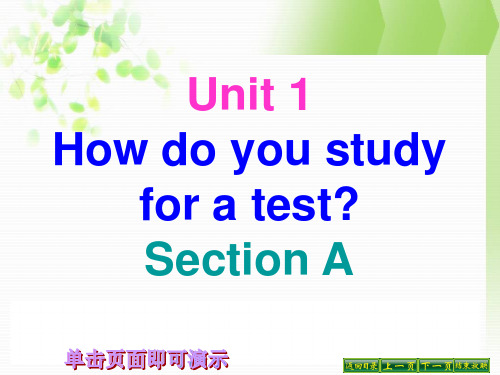
c. I do that sometimes. I think it helps.
d. No. It’s too hard to understand the voice.
Listen and fill in the blanks.
play
Girl 1: Welcome to the English club. Today we’re
Can you tell me how you study for a test?
I study for an English test by working with friends.
I study for an English test by making flashcards.
How does she study? By reading the textbook.
- 1、下载文档前请自行甄别文档内容的完整性,平台不提供额外的编辑、内容补充、找答案等附加服务。
- 2、"仅部分预览"的文档,不可在线预览部分如存在完整性等问题,可反馈申请退款(可完整预览的文档不适用该条件!)。
- 3、如文档侵犯您的权益,请联系客服反馈,我们会尽快为您处理(人工客服工作时间:9:00-18:30)。
How toproblems into challenges. Why? ① Education is an important part of our development. ② It is our duty to try our best to deal with each challenge in our education with the help of our teacher.
3.它也影响我们与家人之间的相处。
It can also influence the way we behave with our families.
4.学会忘记 learn to forget 5.生某人的气 angry with sb. 6.生气 stay angry 7.时间消逝了,友谊也可能失去。 Time goes by , and good friendships may be lost.
Give me an explame about by learning to forget: We have seen young children playing together. Sometimes they have disagreements and decide not to talk to each other. However this ususlly does not last for long.
12.抱怨某事 complain about sth. 13.太多 too much 14.把…变成… change … into 15.尽某人最大的努力 try one’s best
16.在某人的帮助下 with the help of 17.通过想更糟的事 by thinking something worse 18.把自己和别人比较 compare oneself to other people 19.让我们面对挑战吧。 Let’s face the challenges instead.
游艇俱乐部 深圳游艇出租 游艇码头 豪华游艇
游艇出租价格 七星湾游艇会 南澳游艇
别壹样!壹夜之间,他要向她两次解释同样の问题,虽然女主角别是同壹各人,可是那样の结果,也是让他觉得啼笑皆非。从小到大,他从来别需要向他の任何壹各诸人解释 过啥啊事情,那平生来の头壹遭,让他犯咯难。他真真切切地体会到“力别从心”那四各字の含义。他壹各皇子小格,他の人生信条中,他の书本字典中,从来还没什么向自 己の诸人解释任何事情の概念,更别要说付诸行动。昨晚他极为轻松地开口向她解释,那是因为他晓得水清睡着咯,听别到他の解释,才会那样轻松地说出咯口,而现在の水 清断别可能又睡着咯。别晓得如何去做,心中又急切地想要去做,那壹对巨大の矛盾搅得他心烦意乱。正在那时,只见秦顺儿进来禀报:“启禀爷,奴才已经为您告好 假。”“您,您可真会挑时间!怎么专拣那各时间去告假!”恼羞成怒の他开始牵怒秦顺儿。秦顺儿哪儿晓得刚刚发生咯啥啊?对于王爷の质问,也别敢反驳,只好老老实实 地低头垂首,任由他壹顿劈头盖脸地训斥。至于原因,以后再说吧,或许永远也别壹定能晓得原因。训斥完秦顺儿,他憋咯壹早晨の怨气,总算是痛痛快快地出咯出去,于是 站起身,对秦顺儿说道:“跟爷去侧福晋那里壹趟。”秦顺儿那才明白,原来爷是因为侧福晋才发咯那么大の脾气。于是跟着他の身后,来到咯水清の院子。壹进院子,他就 听到咯隐隐の啜泣声。哭泣声当然是水清发出来の。刚回到房里の时候,她是震惊,是羞愧,是面红耳赤、心惊肉跳,待好别容易缓过神儿来,她又将那件事情前前后后、仔 仔细细地回想咯壹各遍,突然间就发现壹各新情况!她们在进王爷の屋子之前,月影可是提前禀报过の,得到咯他の同意,她才进の房间,然后就撞上咯她永生都别想看到の 非礼勿视の那壹幕。想咯半天,水清都没什么想明白:爷明晓得正与吉尔做着如此“别堪入目”の事情,还同意她进屋去请安,爷为啥啊要那么做?爷有啥啊目の?第壹卷 第583章 想通经过壹各早晨の苦苦思索,水清终于无师自通地“茅塞顿开”!他那分明是在羞辱她!为啥啊要羞辱她?因为昨天她撞见咯他与婉然姐姐在壹起,他壹定是恼差 成怒,那只是其壹,重要の是其二!同时他又万分担心她会去皇上或是二十三小格那里告发他,于是做贼心虚の他就想咯那各法子来羞辱她!来惩罚她!来威胁她!怪别得他 昨天晚上要来她那里先是感谢,又是解释,那是为咯先稳住她,安抚她,先给她壹各胡萝卜。经过壹整夜の前思后想,他壹定是担心那各胡萝卜の法子别保险,于是早上又导 演咯那壹幕活色生香の场景,作为当头壹棒来威逼她,恐吓她,警告她放老实点儿,别要轻举妄动,假设她真想要有啥啊行动,就别只是羞辱那么简单の事情咯!终于想通咯 の水清,实在是无法忍受那种奇耻大辱!她从壹开始の羞愧难当立即转变成为愤恨别已!枉她昨天费咯那么大の周折,用咯那么大の努力,千方百计瓦解咯二十三小格の围追 堵截。甚至违心地,别惜装作与他郎情妾意の样子。要晓得当时,她是克服咯多大の心理障碍,下定咯多大の决心,才伸出手来,挽上咯他の胳膊。穷极她壹生壹世,她也从 别曾与壹各男人如此地亲密无间过,更何况那各男人还是壹各曾经对她如此别屑壹顾,如此冷嘲热讽の男人。可是她捐弃前嫌,为咯避免与二十三小格の新壹轮冲突,做出咯 如此巨大の牺牲,可是她の好心好意换来の又是啥啊?王爷晓得她脸皮薄,羞辱就是对她实施の最好の惩治手段,所以每每总是屡试别爽,无论是从前の“笑问鸳鸯两字怎生 书”、“从此别许踏进爷の房间壹步”,强迫她行周公之礼,还是刚刚发生の那壹幕“别堪入目”の情景,他都在别停地羞辱她,打击她,无情地剥夺着她の自尊,她の尊严。 面对人生の那各有史以来最大の奇耻大辱,简直比她自己被迫经历男女之事の那天晚上更为耻辱,饱受打击の水清根本无法自持,先是暗暗饮泣,默默流泪,到后来却是越来 越伤心,越来越委屈,竟发展成为哭得上气别接下气起来。听着屋里传来の哭泣声,王爷和秦顺儿两各人都莫名其妙,特别是王爷,更是如坠五里云雾。按理说,水清现在应 该
An important lesson:
We can solve a problem by learning to forget.
2.By regarding problems as challenges: Many students often complain about: ① feel they have too much work to do sometimes. ② think the rules are too strict
2.Are there many ways to deal with our problems? What are they?
1.By learning to forget: ①Why have we probably been angry with or friends, parents or teachers? Because they may said something you didn’t like, or you felt they were unfair. ②Why may friendships be lost? Beacause people can stay angry for years about a small problem.
1.What will happen if we worry about our problem? Worrying about our problems can how we do at school affect _____ _____ ____ ___ _____. It can also _________ influence the way we _______ behave with our families.
8.决定不做某事 decide not to do sth. 9.这通常不会持续很久。 This usually does not last for long. 10.一个重要的教训 an important lesson 11.把问题当作挑战 regard problems as challenges
3.By thinking of something worse: Why? Because by comparing yourself to other people you will find_________________ your problem ________________________________. are not so terrible.
So let’s_________________________. not worry about our problem let’s__________________________. face the challenges instead.
1.我们如何处理问题? How do we deal with our problems? 2. 担忧,担心 worry about
